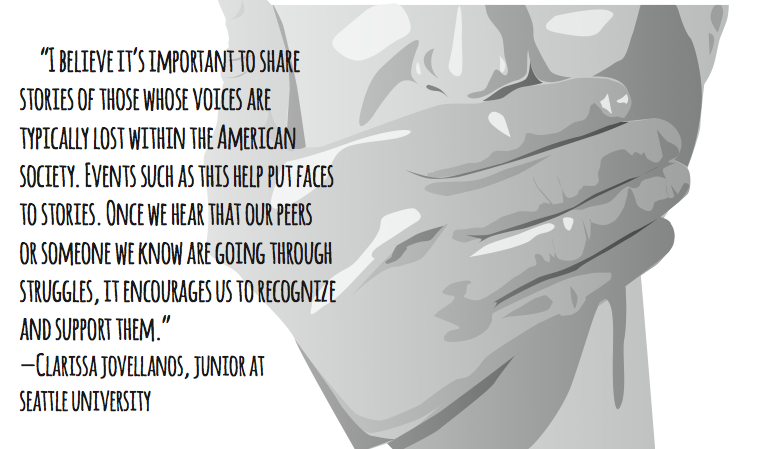At the “‘I Don’t See Yellow’ and Other Excuses to Marginalize API Minorities” event, juniors Jenna Shinsato and Emily Kawahigashi aim to provide a safe space for members of the Asian and Pacific Islander (API) community at Seattle University to share experiences.
“I think my main goal is to validate those experiences for people [who] don’t really know what they’re feeling or what’s going on and why they feel marginalized,” Shinsato said. Shinsato and Kawahigashi are co-organizers of the event.
According to the Facebook event page, the program will open with a video, student speakers, and small group discussions. Topics to be discussed include intersectionality, stereotypes, feeling silenced in classrooms and the language necessary to articulate these issues.
“There’s a lack of students knowing the language, so when it comes to microaggressions and intersectionality, it’s hard to identify those kind of things if you don’t know exactly what they are,” Kawahigashi said. “I think it’s something we should know a lot earlier in our college career or even high school. We just wanted to host this as a way to bring that language around to other people who might not be aware of it.” Shinsato mirrored Kawahigashi’s comments.
“To contextualize something, you have to be able to articulate it,” Shinsato said. “…there are key words that really solidify what it means to have those experiences…Because there’s the word ‘microaggressions,’ all those experiences can be encompassed in one term.”
The organizers and junior Clarissa Jovellanos agree that not all members of the API community have the same experience. Jovellanos, who is also a member of the United Filipino Club on campus, is one of the selected student panelists.
“I believe it’s important to share stories of those whose voices are typically lost within the American society. Events such as this help put faces to stories. Once we hear that our peers or someone we know are going through struggles, it encourages us to recognize and support them,” Jovellanos said. “We all have our own narrative. We may not completely understand another person’s experience, but we can still learn and be in solidarity with them.”
Panelists have the freedom to bring up relevant topics of their experiences and encourage attendees to participate in group discussions. When asked if people outside the API community are able to attend, Shinsato and Kawahigashi said all people are welcome. Though the event is geared toward API minorities, non-API people of color and white people may be able to learn from an informational standpoint, and become more aware of what’s happening on campus.
“For younger students, I want to reach out to them because I wish someone reached out to me and told me what it was like to be a minority and that it was okay that I was Asian and that it was okay that I wasn’t white, and be proud of it,” Shinsato said.
Shinsato and Kawahigashi’s long-term goal is to turn this single event into a series this coming school year in the fall. Subsequent sessions would narrow in on specific topics.
“We want to do a faculty-based one where the faculty [members] who feel uncomfortable discussing can explain what it’s like to be on Seattle University’s campus,” Shinsato said. “I want something to change. I want the API and all minorities to be recognized by the administration here.”
Kawahigashi said that she is looking forward to discussions where people can truly express themselves in a meaningful way.
“…Or how they felt as if this university has empowered them in some way or another and they found support groups, and what shape those things take so then you can see what’s working for students, what’s supporting them and what maybe is a little lacking,” Kawahigashi said. “From there, we can move on, looking at how those things can be fixed whether it’s between students, dialogue with the school, proposals, etc.”
Attendees are encouraged to come with open minds to better facilitate the unpacking of these subjects.
“I look forward to this event because it will be a great experience to hear the stories of my fellow classmates and colleagues as well as have a dialogue of these topics with the SU community in a safe environment. I hope that this event will spark interest and critical thinking in people,” Jovellanos said.
Taking into account reception and feedback, this meeting will be the first step in Shinsato and Kawahigashi’s project to focus more on student experiences than lectures in a classroom.
Shinsato and Kawahigashi will be leading this discussion-based event in partnership with the Office of Multicultural Affairs on Wednesday, May 25 in Pigott 203 at 6 p.m.
The editor may be reached at news@su-spectator.com









